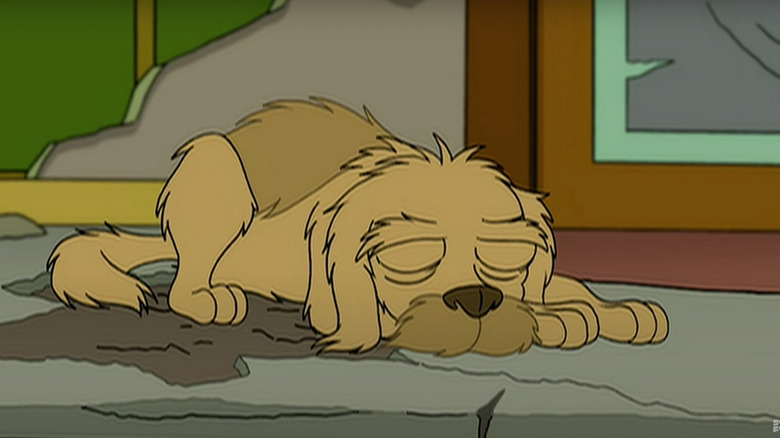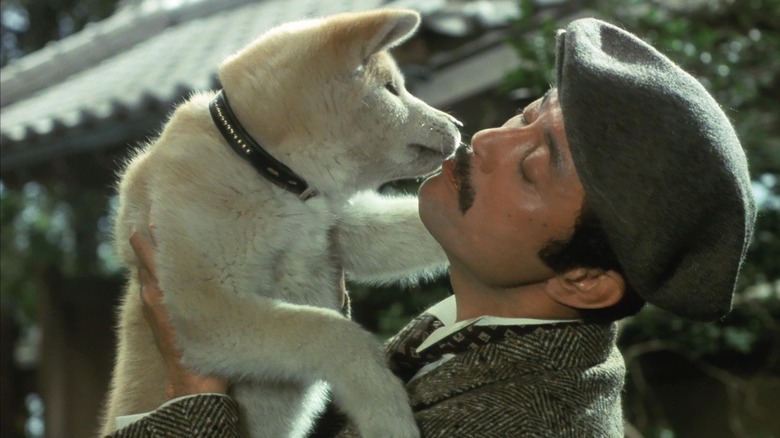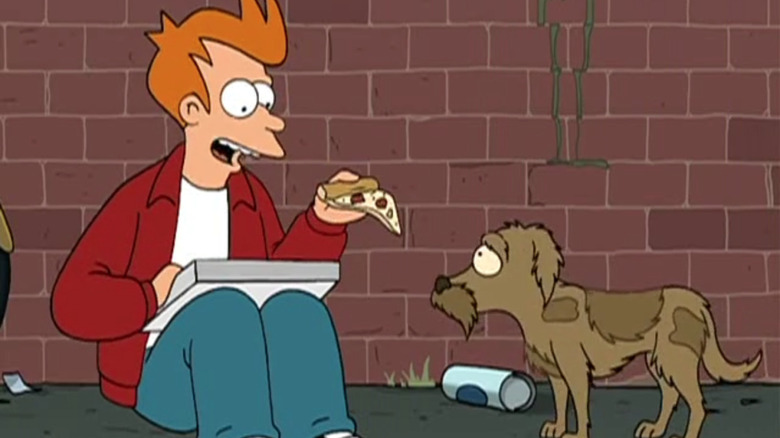The Heartbreaking '80s Japanese Drama That Inspired Futurama's Saddest Episode
All good sitcoms have that one random tearjerker episode tossed in, and for "Futurama" that episode is clearly "Jurassic Bark." It gives us the tale of Fry's old dog Seymour, who tries his hardest to find Fry after he's trapped inside a cryogenic chamber. Eventually, Seymour gives up and spends the rest of his life outside the pizza parlor Fry worked at, waiting in vain for Fry to return. It's a dark sequel of sorts to the previous season's "Luck of the Fryrish," which ended on a more heartwarming note with Fry's brother naming his son after him.
"['Luck of the Fryrish'] gave us the right to try for one of these emotional episodes," co-creator David Cohen explained in a panel for Nerdist. "About once a year would you say we do one? So we did 'Jurassic Bark' with Fry's dead dog, which people care much more about than humans for some reason."
Sure enough, viewers tend to care more about dogs than they do human characters because dogs are pure, dependable, and cute to look at. Most importantly, a dog's whole life can often revolve around its owner. We know Fry's brother can move on with his life after Fry's disappearance, but we know for certain now that Seymour's whole life revolved around someone who never came back for him. It's almost too depressing to handle.
For co-creator Matt Groening, the decision to give Seymour a tragic ending was inspired by a 1987 Japanese drama called "Hachikō Monogatari," about another loyal dog who waits in vain for his owner's return.
One of the most beloved dogs of all time
"I went to see that movie knowing that, okay, this is going to be the biggest tear-jerker of all, I'm not gonna cry, I am not going to cry. I don't care, at the end when the dog dies I will not cry," Groening explained. "The movie starts, the dog's a puppy, I started bawling. So when [David Cohen and Eric Kaplan] said, 'We're gonna kill the dog,' I said, 'You can't kill the dog!' And not only is the dog dead, [but] apparently the dog waits for Fry and doesn't move! For season after ... he gets snowed on!"
Groening's not the only one to cry during "Hachikō." The movie was the biggest Japanese film of 1987, and the real-life story it's based on is well-known in the country. To "Futurama" fans, the story will surely sound familiar: a young Japanese Akita dog would travel on his own to the nearby train station to meet with his owner on his way home from work. One day the owner died suddenly of a cerebral hemorrhage at his job, and because it's impossible to explain all this to a dog, Hachikō would return to the station every day to wait for his owner's return. Ever since, Hachikō has been held up as a shining example of unwavering love and loyalty and has been well-remembered in pop culture ever since.
A time-honored trope
The story of a loyal dog waiting for its owner goes far past the real-life case of Hachikō. Another memorable example of it came from Homer's "Odyssey" over 2,500 years ago. The main character Odysseus spends 20 years away from home, all while his faithful dog Argos waits his whole life for his return. The dog was strong and fast when Odysseus left, but by Book 17 he's weak and neglected, discovered by Odysseus laying in a pile of manure.
To ramp up the melodrama even further, Odysseus is unable to embrace his beloved dog because he's currently in disguise, and Argos dies immediately after. Don't worry, though: Argos was still able to recognize Odysseus, and he died having "fulfilled his destiny of faith." This storyline might be a bit of a bummer to "Futurama" fans, struck with the realization that even the tragedy-obsessed works of Greek mythology still gave their loyal dog character a happier ending than Seymour's. Argos may have lived a sad life, but at least his waiting was vindicated in the end.
On the bright side, "Futurama" did give us a follow-up to Seymour's storyline in its 2007 movie "Bender's Big Score," revealing that Fry returned to the present for a few years and got to reunite with Seymour after all. Was this the right choice from the writers, or did this undermine the impact of one of the series' most emotionally affecting episodes? Fans have been debating this for years. But for those who find the ending of "Jurassic Bark" unbearably sad, it's nice that the show decided to throw Seymour a bone.


